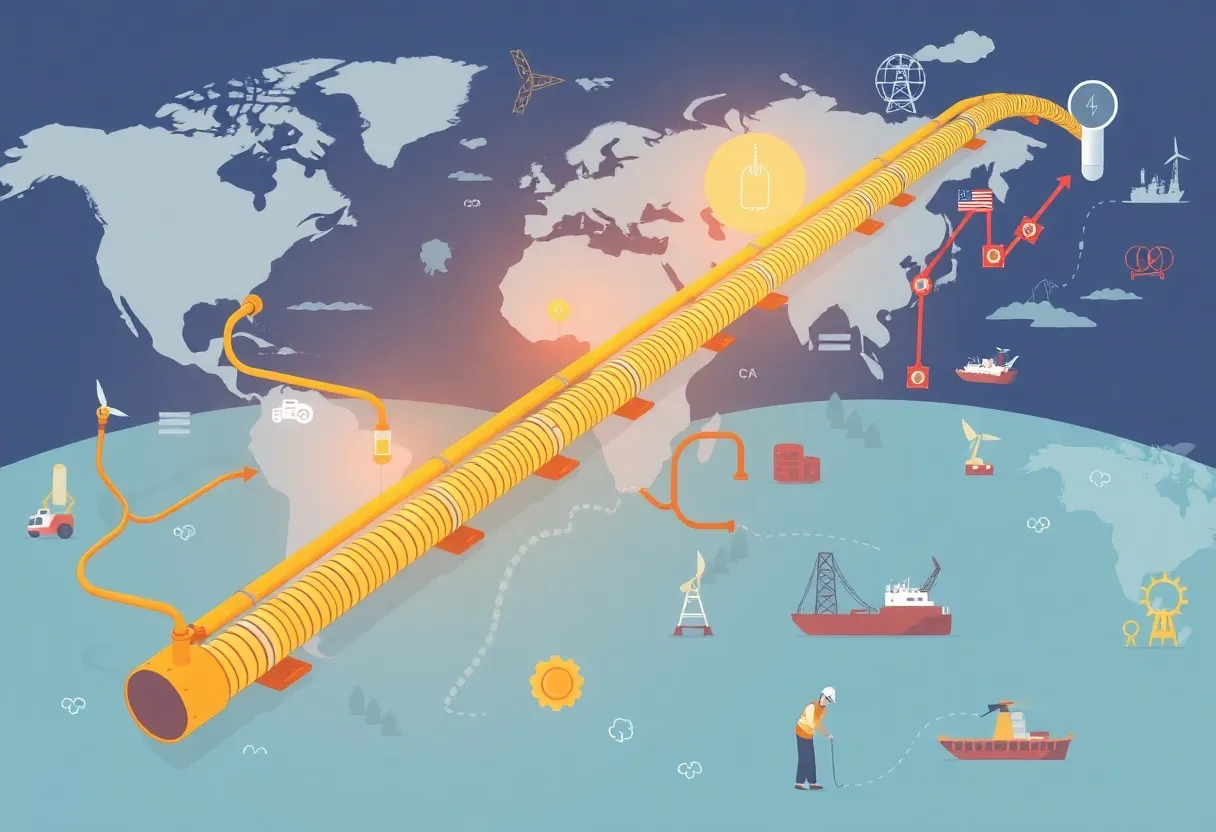News Summary
U.S. energy policy is undergoing significant changes with varying stances from current and former administrations regarding natural gas exports. Driven by geopolitical shifts and competition, U.S. energy diplomats stress the need for energy security. Recent developments show a marked increase in liquefied natural gas (LNG) exports and a decreasing reliance on Russian fossil fuels in Europe. Ongoing discussions around energy sourcing and strategic moves signal a transformative period for global energy dynamics and national security.
U.S. Energy Diplomats Speak Up on Natural Gas Exports
In the world of energy, things are buzzing as U.S. energy policy continues to evolve under differing leadership perspectives. The topic of **natural gas exports** is heating up, especially with the backdrop of global competition and geopolitical tensions making headlines.
Divided Energy Policies
A clear split has emerged in U.S. energy policy under President Biden and former President Trump, particularly regarding **climate change** and the use of **fossil fuels**. President Biden’s administration often views energy as a potential liability, while Trump’s stance has been to roll back certain regulations, like **electric vehicle tax credits**, as he focuses on enhancing fossil fuel exports.
Adding fuel to the fire, Chris Wright, known for his role in fossil fuels, is being nominated to head the **Department of Energy**. He has plans to critique Biden’s climate policies during his upcoming confirmation hearing, stating emphatically that energy should be considered a national security asset. This aligns with the thoughts of Geoffrey Pyatt, Biden’s top energy diplomat, who echoed sentiments that energy is vital for national security in today’s competitive international arena.
U.S. Natural Gas Gains Strength
Since 2016, the U.S. has taken significant strides in the energy sector. Crude oil production has surged an impressive **70%** over the past eight years. Meanwhile, **liquefied natural gas (LNG)** exports, which were nearly nonexistent just a few years ago, have skyrocketed, securing the U.S.’s spot as a dominant player in the global market. Today, the country enjoys a state of **energy security**, with minimal reliance on **Middle Eastern** energy sources.
Facing Global Competition
As the **European Union (EU)** seeks to reduce its dependence on **Russian fossil fuels** amid ongoing conflicts, the dynamics of the energy market are shifting. After Russia’s gas transit contract with Ukraine expired at the end of 2022 without any further negotiations, European gas imports from Russia have seen changes. Despite the unrest, gas has still flowed, but pipeline imports are on the decline.
In fact, in 2024 alone, Europe imported around **21.5 billion cubic meters of LNG** from Russia, accounting for only **19%** of its total LNG imports. The U.S., on the other hand, stands out as the largest supplier of LNG to Europe, providing a remarkable **48%** of its LNG needs in the same period.
Future Trends and Strategic Moves
In a bid to tackle energy sourcing more strategically, the EU launched the **REPowerEU plan** aimed at diversifying energy supplies and decreasing reliance on Russian fossil fuels, especially in response to geopolitical developments. The dependence on Russian gas fell sharply from **45%** in 2021 down to about **15%** in 2023. However, the figure crept back up to **18%** in 2024, prompting even more discussion about energy security within Europe.
Simultaneously, Kazakhstan is gearing up to strengthen its gas exports to **China**, with plans for a new pipeline that could significantly increase flows. Currently, Kazakhstan exports approximately **4 billion cubic meters** of natural gas to China annually. If the new project is greenlighted, it could cost between **$3 billion and $6 billion** and take two to three years to complete.
Looking Ahead
The landscape of global energy is transforming, and with the ongoing energy crises and geopolitical tensions, U.S. energy diplomats are keenly aware of the importance of adapting strategies to maintain competitive edge. The actions over the next few years may well dictate how the U.S. and its allies navigate this choppy sea of energy security and climate responsibilities.
As policymakers and executives alike grapple with their stances on energy, one thing is clear: the battle for energy dominance and security is more critical than ever, and countries are now rethinking how they approach energy exports in an increasingly complex world.
Deeper Dive: News & Info About This Topic
- The Conversation: Future of Russian Gas Looking Bleak
- Google Search: Russian Gas
- Bloomberg: Kazakhstan Seeks to Boost China Gas Exports
- Wikipedia: Natural Gas
- Oil Price: Kazakhstan in Talks With China to Increase Natural Gas Exports
- Reuters: Gazprom Loss Shows Struggle to Fill EU Gas Sales Gap
- SCMP: Russian Gas Exports to Europe
- Encyclopedia Britannica: Natural Gas

Author: STAFF HERE Chapin
CHAPIN STAFF WRITER The CHAPIN STAFF WRITER represents the experienced team at HEREchapin.com, your go-to source for actionable local news and information in Chapin, Lexington County, and beyond. Specializing in "news you can use," we cover essential topics like product reviews for personal and business needs, local business directories, politics, real estate trends, neighborhood insights, and state news affecting the area—with deep expertise drawn from years of dedicated reporting and strong community input, including local press releases and business updates. We deliver top reporting on high-value events such as the Chapin Christmas Parade, Fourth of July Celebration, and the Chapin Fall Festival. Our coverage extends to key organizations like the Chapin Chamber of Commerce and the Lexington School District One, plus leading businesses in retail and recreation that power the local economy such as Lake Murray Tourism and the Chapin Visitor Information. As part of the broader HERE network, including HEREaiken.com, HEREbeaufort.com, HEREchapin.com, HEREcharleston.com, HEREclinton.com, HEREcolumbia.com, HEREgeorgetown.com, HEREgreenwood.com, HEREgreenville.com, HEREhiltonhead.com, HEREirmo.com, HEREmyrtlebeach.com, HEREnewberry.com, HERErockhill.com, HEREspartanburg.com, HEREaustin.com, HEREcollegestation.com, HEREdallas.com, HEREhouston.com, and HEREsanantonio.com, we provide comprehensive, credible insights into South Carolina's dynamic landscape.





